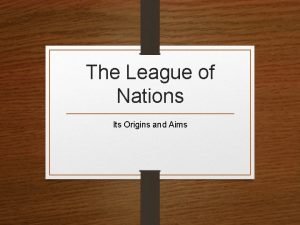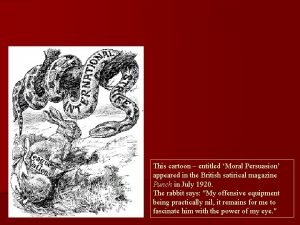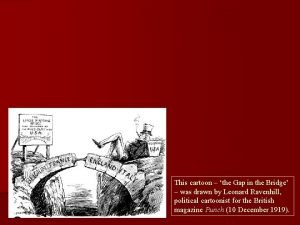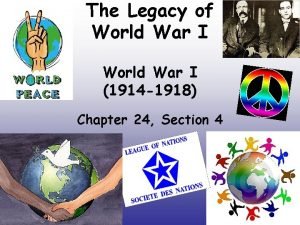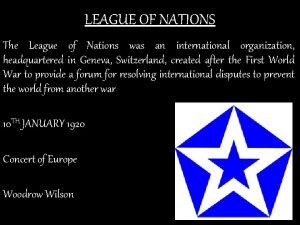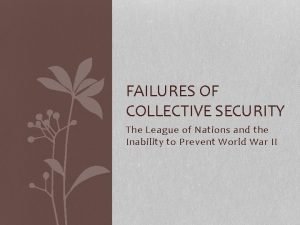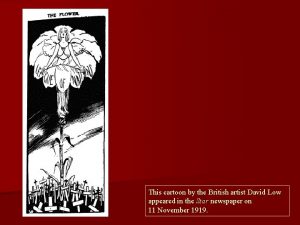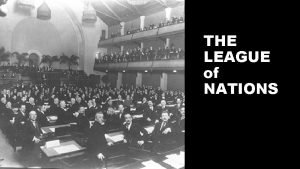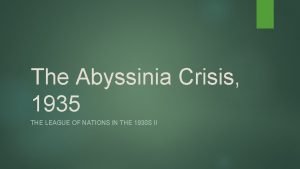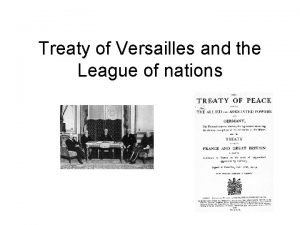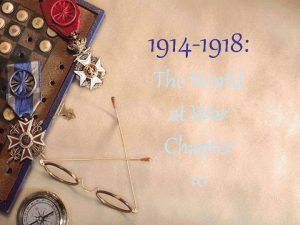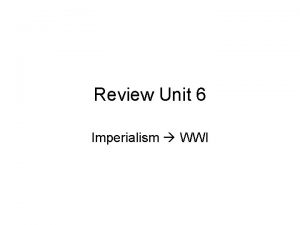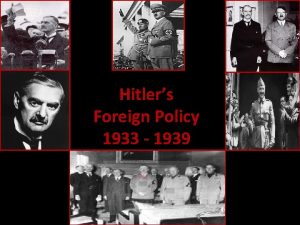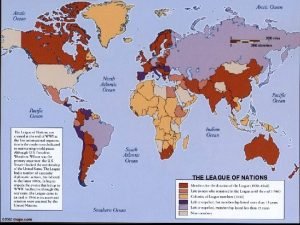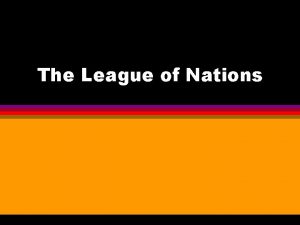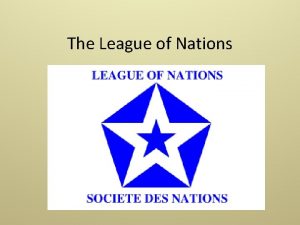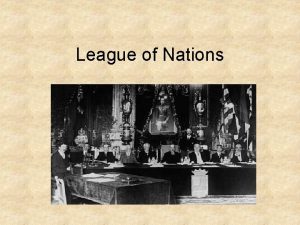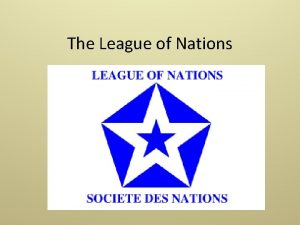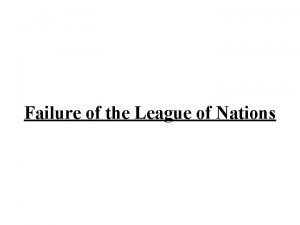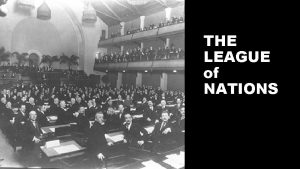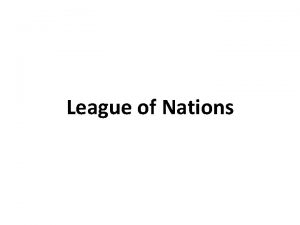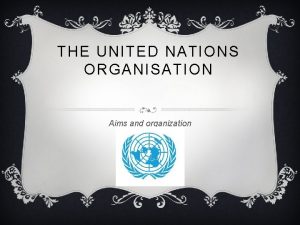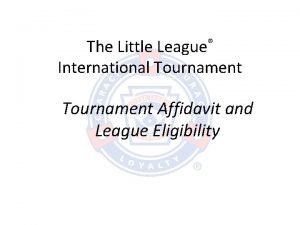The League of Nations Its Origins and Aims























- Slides: 23

The League of Nations Its Origins and Aims

Wilson and his Fourteen Points A general association of nations must be formed under specific covenants for the purpose of affording mutual guarantees of political independence and territorial integrity to great and small states alike – US President Woodrow Wilson in his “Fourteen Points”covenants speech, January 1918 – Binding agreements made between nations

So, how did the “League” begin? • Wilson included the idea in his Fourteen Points …but…. • 1915 – The League to Enforce Peace (LEP) proposed an international agreement • Participating nations would agree to “jointly use their economic and military force against any one of their number that goes to war or commits acts of hostility against another. ” • 1915 – British League of Nations is founded

Other’s had the idea, too! • 1916 – senior British politician Lord Robert Cecil submitted a memo to the government, advocating: • An international organization to settle future disputes between nation-states • Help preserve world peace • Leon Bourgeois (France) and Paul Hymans (Belgium) made similar proposals to their governments • Jan Smuts (South Africa) published a treatise called “The League of Nations: A Practical Suggestion”

Well, why do people think it’s Wilson’s idea? • Wilson becomes one of the biggest supporters of the idea for the League of Nations • Was chairman of a multinational commission set up to agree on the precise wording of the League of Nations’ Covenant • The commission included 2 representatives each from: USA, UK, France, Italy, and Japan • The commission included 1 representative each from: Belgium, China, Portugal, and Serbia • Later, Czechoslovakia, Greece, Poland, and Romania were added

Wilson – the League’s Champion! • Wilson insisted that each of the peace treaties from the conference include the League of Nations’ Covenant (yes, there were other treaties besides the Treaty of Versailles) • Embarked on an grueling tour of the US to promote and convince the US public about the League of Nations’ importance • Wilson will be awarded the Nobel Peace Prize in 1919 for his role in establishing the League of Nations

It’s your birthday! • The League of Nations formally established by Part 1 of the Treaty of Versailles on June 28, 1919 • 42 nation-states became the founding members

The “cool” 42 • • • Argentina kia • • Belgium • Bolivia • Brazil • Canada • Chile • China • Colombia Cuba • Czechoslova • Denmark Australia El Salvador • Liberia • The • • Netherlands • New Zealand • Nicaragua • Norway • Panama • Paraguay • • • Greece • Guatemala • Haiti • Honduras • Persia India • Peru Italy • Poland Japan France Portugal Romania Siam Spain Sweden Switzerland South Africa United kingdom • Uruguay • Venezuela • Yugoslavia

THE HIGH CONTRACTING PARTIES, In order to promote international co-operation and to achieve international peace and security By the acceptance of obligations not to resort to war, By the prescription of open, just and honorable relations between nations, By the firm establishment of the understandings of international law as the actual rule of conduct among Governments, and By the maintenance of justice and a scrupulous respect for all treaty obligations in the dealings of organized peoples with one another, Agree to this Covenant of the League of Nation The opening section of the League of Nations’ Covenant

The Aims of the League of Nations • Preventing future war • Administering the post-war peace settlements • Promoting international co-operation

Origin of the League of Nations

Preventing Future Wars • Many of the leaders believed that the first war could have been avoided if there had been an international organization designed to settle disputes between nations. • The League was intended to make sure the Great War was the “war to end all wars”

Preventing Future Wars – How? • By promoting disarmament(Article 8) • By abolishing secret diplomacy (Article 18) • By member states agreeing to the League of Nations arbitration of any dispute between them (Article 13) • By developing the notion of collective security (Article 16)

Disarmament “Members of the League recognize that the maintenance of peace requires the reduction of national armaments to the lowest point consistent with national safety. ”

Secret Diplomacy • Wilson strongly believed that the main cause of World War I was the secret diplomacy that had led to the Triple Alliance and Triple Entente • Any future treaty agreed upon by member states had to be registered with and published by the League of Nations

Arbitration • arbitration – Mediation between opposing sides in a disagreement. • The League of Nations would investigate the dispute and consider the rights and wrongs of each party. • The League would pass judgment on how the dispute should be settled. • The League’s decision would be binding on both parties

Collective Security • Member states of the League of Nations would work together against any country: • Whose actions were seen as a threat to peace by acting aggressively • Ignoring decisions made by the League of Nations • Penalties could include: • economic sanctions – Refusing to trade with a nation that was acting in defiance of the League’s judgments • Joint military action

Administering the post-war peace settlements • Two major ways the League of Nations would ensure the peace settlements of the Paris Peace Conference were carried out: • Plebiscites • Mandates • The Saar Valley situation is an example of a plebiscite situation – The League of Nations controlled the area for 15 years and then the people got to decide in 1935 if they were part of France or Germany

Mandates • Defeated countries lost their colonies as a result of many of the treaties • Many of the colonies, though, were not ready for full independence • Former colonies would be run as mandates • Mandates – territory entrusted to another country (known as the Mandatory) appointed by the League of Nations • The Mandatories would submit annual report to the Mandate Commission and it would review the progress of the mandates territory

Three Classes of Mandates • Class A mandates – almost ready for independence • Mandatory was to provide administrative advice • Examples include Mesopotamia (Britain) and Syria (France) • Class B mandates – required a greater degree of control • Mainly the former African colonies of Germany • Class C mandates – essentially continue as colonies • “best administered under the laws of the Mandatory as integral portions of its territory” • Examples include South-West Africa and some South Pacific Islands



Promoting international cooperation Actively work towards improving relations between member nations and their citizens: • by seeking to improve working conditions and wage levels throughout the world through an International Labor Organization (ILO) • by repatriating prisoners of war and resettling refugees • by providing loans to the new countries, such as Austria and Hungary • by encouraging the development of education • by promoting improvements of public health
 Write about the league of nations?
Write about the league of nations? International strife
International strife The gap in the bridge analysis
The gap in the bridge analysis The treaty of versailles
The treaty of versailles About the league of nations
About the league of nations League of nations structure
League of nations structure League of nations
League of nations The failure of the league of nations
The failure of the league of nations A cartoon that appeared in a british newspaper in 1919
A cartoon that appeared in a british newspaper in 1919 League of nations in hindi
League of nations in hindi Whose idea was league of nations
Whose idea was league of nations Abyssinian crisis league of nations
Abyssinian crisis league of nations Corfu incident league of nations failure
Corfu incident league of nations failure Whats the league of nations
Whats the league of nations League of nations
League of nations This cartoon is suggesting that the league of nations would
This cartoon is suggesting that the league of nations would When was the league of nations created
When was the league of nations created League of nations 14 points
League of nations 14 points Halloween has its origins in which ancient celtic festival
Halloween has its origins in which ancient celtic festival The emigree key themes
The emigree key themes Its halloween its halloween the moon is full and bright
Its halloween its halloween the moon is full and bright Hip thigh and leg muscles
Hip thigh and leg muscles Comparison of virtual circuit and datagram network
Comparison of virtual circuit and datagram network The origins and spread of christianity
The origins and spread of christianity
